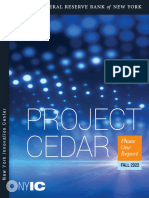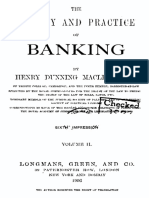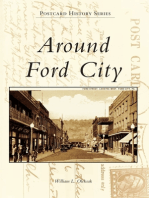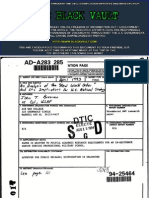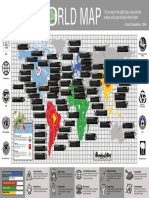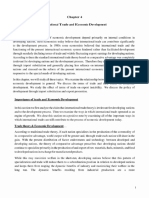0 ratings0% found this document useful (0 votes)
34 viewsPujo Committee Explained Explained - Today-2
Pujo Committee Explained Explained - Today-2
Uploaded by
Keith KnightEvidence in the investigation into Tax-Exempt Foundations and their effort to control the minds of Americans forming a New World Order.
Cox, Reece, Norman Dodd, Pujo, G. Edward Griffin, Ford, Rockefeller, Carnegie all involved.
Copyright:
© All Rights Reserved
Available Formats
Download as PDF, TXT or read online from Scribd
Pujo Committee Explained Explained - Today-2
Pujo Committee Explained Explained - Today-2
Uploaded by
Keith Knight0 ratings0% found this document useful (0 votes)
34 views2 pagesEvidence in the investigation into Tax-Exempt Foundations and their effort to control the minds of Americans forming a New World Order.
Cox, Reece, Norman Dodd, Pujo, G. Edward Griffin, Ford, Rockefeller, Carnegie all involved.
Original Title
Pujo Committee Explained Explained.today-2
Copyright
© © All Rights Reserved
Available Formats
PDF, TXT or read online from Scribd
Share this document
Did you find this document useful?
Is this content inappropriate?
Evidence in the investigation into Tax-Exempt Foundations and their effort to control the minds of Americans forming a New World Order.
Cox, Reece, Norman Dodd, Pujo, G. Edward Griffin, Ford, Rockefeller, Carnegie all involved.
Copyright:
© All Rights Reserved
Available Formats
Download as PDF, TXT or read online from Scribd
Download as pdf or txt
0 ratings0% found this document useful (0 votes)
34 views2 pagesPujo Committee Explained Explained - Today-2
Pujo Committee Explained Explained - Today-2
Uploaded by
Keith KnightEvidence in the investigation into Tax-Exempt Foundations and their effort to control the minds of Americans forming a New World Order.
Cox, Reece, Norman Dodd, Pujo, G. Edward Griffin, Ford, Rockefeller, Carnegie all involved.
Copyright:
© All Rights Reserved
Available Formats
Download as PDF, TXT or read online from Scribd
Download as pdf or txt
You are on page 1of 2
http://everything.explained.
today/Pujo_Committee/
Pujo Committee Explained
explained.today
Pujo Committee Explained
The Pujo Committee was a United States congressional subcommittee which was formed between May
1912 and January 1913 to investigate the so-called "money trust", a community of Wall Street bankers and
financiers that exerted powerful control over the nation's finances. After a resolution introduced by
congressman Charles Lindbergh Sr. for a probe on Wall St. power, Arsne Pujo of Louisiana obtained
congressional authorization to form a subcommittee of the House Committee on Banking and Currency.
Overview
Despite the fact that lead attorney Samuel Untermyer had predetermined that no money trust would be
found as part of the Investigation because There is no agreement existing among these men that is in
violation of the law [1] and despite of the refusal of aid by the Comptroller of the Currency, the failure of the
Senate pass the bill to amend section 5241 of the Revised Statutes and the lack of any authoritative
decision by the courts sustaining the committee's right to access the books of the national banks,the Pujo
Committee Report concluded in 1913 that a community of influential financial leaders had gained control of
major manufacturing, transportation, mining, telecommunications and financial markets of the United
States. The report revealed that no less than eighteen different major financial corporations were under
control of a cartel led by J.P Morgan, George F Baker and James Stillman. These three men, through the
resources of seven banks and trust companies (Bankers Trust Co., Guaranty Trust Co., Astor Trust Co.,
National Bank of Commerce, Liberty National Bank, Chase National Bank, Farmers Loan and Trust Co.)
controlled an estimated $2.1 billion. The report revealed that a handful of men held manipulative control of
the New York Stock Exchange and attempted to evade interstate trade laws.
The Pujo Report singled out individual bankers including Paul Warburg, Jacob H. Schiff, Felix M. Warburg,
Frank E. Peabody, William Rockefeller and Benjamin Strong, Jr.. The report identified over $22 billion in
resources and capitalization controlled through 341 directorships held in 112 corporations by members of
the empire headed by J.P. Morgan.[2]
Although Pujo left Congress in 1913, the findings of the committee inspired public support for ratification of
the Sixteenth Amendment in 1913, passage of the Federal Reserve Act that same year, and passage of
the Clayton Antitrust Act in 1914. They were also widely publicized in the Louis Brandeis book, Others
People's Money--and How the Bankers Use It.
House of Morgan partners blamed the April 1913 death of J.P. Morgan on the stress of testifying in the
Pujo hearings, though other health factors were certainly involved.
See also
Pecora Commission
United States v. Morgan et al. (the Investment Bankers Case)
Ron Chernow, The House of Morgan: An American Banking Dynasty and the Rise of Modern
Finance (2001) ISBN 0-8021-3829-2
United States. Congress. House. Committee on Banking and Currency. Money trust investigation.
Investigation of financial and monetary conditions in the United States under House resolutions
nos.429 and 504, before a subcommittee of the Committee on Banking and Currency. Washington,
Page 1 of 2Govt.
Print. Off., 1913.
Dec 11, 2015 07:01:49PM MST
http://everything.explained.today/Pujo_Committee/
Govt. Print. Off., 1913.
http://www.scribd.com/doc/34121180/Pujo-Committee-Report-Report-of-the-Committee-Appointed-Pursua
Pujo Committee Hearings - searchable full-text - Also known as Money Trust Investigation.
Investigation of Financial and Monetary Conditions in the United States Under House Resolutions
Nos. 429 and 504.
Pujo Committee Hearings - Exhibit 134-C Explanation of Table of Interlocking Directorates Pujo
Committee 1912
Page 2 of 2
Dec 11, 2015 07:01:49PM MST
You might also like
- The Bad War - The Truth NEVER Taught About World War II by Mike KingDocument245 pagesThe Bad War - The Truth NEVER Taught About World War II by Mike KingMed1aN1ckNo ratings yet
- Hidden (Occult) Meanings in The English Language-190Document190 pagesHidden (Occult) Meanings in The English Language-190Keith Knight97% (29)
- Get DocumentDocument1 pageGet DocumentKatooma HeavenNo ratings yet
- Fiori TilesDocument9,441 pagesFiori TilesbenahmidaNo ratings yet
- 1934 Citizenship Act 73rd CongressDocument2 pages1934 Citizenship Act 73rd CongresspatriotlindaNo ratings yet
- DOJ Memo in Support of Kavanaugh FBI Documents MSJDocument54 pagesDOJ Memo in Support of Kavanaugh FBI Documents MSJLaw&Crime100% (1)
- Obamas Birthday FraudDocument5 pagesObamas Birthday FraudTruthSeeker200940% (5)
- The Complete Diaries of Theodor Herzl Eng Volume 1Document224 pagesThe Complete Diaries of Theodor Herzl Eng Volume 1Keith Knight100% (2)
- The Complete Diaries of Theodor Herzl Eng Volume 3Document228 pagesThe Complete Diaries of Theodor Herzl Eng Volume 3Keith Knight67% (3)
- The Complete Diaries of Theodor Herzl Eng Volume 2Document208 pagesThe Complete Diaries of Theodor Herzl Eng Volume 2Keith Knight100% (1)
- Hidden History of Money & New World Order Usury-730Document730 pagesHidden History of Money & New World Order Usury-730Keith Knight100% (17)
- The Complete Diaries of Theodor Herzl Eng Volume 5Document171 pagesThe Complete Diaries of Theodor Herzl Eng Volume 5Keith Knight75% (4)
- Stanley F. Allen F.C.A. (Aust.) - The Pirates of Finance (1947)Document69 pagesStanley F. Allen F.C.A. (Aust.) - The Pirates of Finance (1947)bookbenderNo ratings yet
- Pujo Committee 2Document3 pagesPujo Committee 2Keith KnightNo ratings yet
- Senate Hearings: Treasury and General Government AppropriationsDocument562 pagesSenate Hearings: Treasury and General Government AppropriationsScribd Government DocsNo ratings yet
- Dictionar Comunicare Politica SUA PDFDocument182 pagesDictionar Comunicare Politica SUA PDFCătălin PredaNo ratings yet
- Ma vs. Fernandez, G.R. No. 183133, July 26, 2010Document18 pagesMa vs. Fernandez, G.R. No. 183133, July 26, 2010AttyStickmanNo ratings yet
- House Hearing, 110TH Congress - United States Trustee Program: Watchdog or Attack Dog?Document282 pagesHouse Hearing, 110TH Congress - United States Trustee Program: Watchdog or Attack Dog?Scribd Government DocsNo ratings yet
- 11 Civ 8500 Keenan ComplaintDocument114 pages11 Civ 8500 Keenan Complaintjhaines6No ratings yet
- Bilderberg Group Occupational ChartDocument25 pagesBilderberg Group Occupational ChartbilderbergboysNo ratings yet
- Establishment of One New World OrderDocument9 pagesEstablishment of One New World OrderGuy Razer100% (1)
- 235 Military Leaders Endorse President Trump FinalDocument9 pages235 Military Leaders Endorse President Trump FinalJamie White100% (1)
- 15-4 Paul's Rights As A Roman CitizenDocument2 pages15-4 Paul's Rights As A Roman Citizenmartin100% (1)
- U.S. Nonresident Alien Income Tax Return: Filing StatusDocument2 pagesU.S. Nonresident Alien Income Tax Return: Filing StatustonywolfaceveNo ratings yet
- CEI v. U.S. Department of Treasury - ComplaintDocument9 pagesCEI v. U.S. Department of Treasury - ComplaintCompetitive Enterprise InstituteNo ratings yet
- Executive Order 12148Document9 pagesExecutive Order 12148Jeremy Green100% (1)
- Barrack ECONDocument12 pagesBarrack ECONZerohedge100% (1)
- To United Nations AgainDocument19 pagesTo United Nations AgainFrank GallagherNo ratings yet
- The Citizens Grand Jury by NBTurner (Updated) 21OCT2010Document4 pagesThe Citizens Grand Jury by NBTurner (Updated) 21OCT2010Neil B. TurnerNo ratings yet
- The Fourteenth Amendment Created Two Citizens - A Concise ExplanationDocument4 pagesThe Fourteenth Amendment Created Two Citizens - A Concise ExplanationDan Goodman100% (1)
- HR - The Nuremberg CodeDocument2 pagesHR - The Nuremberg CodeHRCNo ratings yet
- 01-07-2010 Operation Still Point Christopher StoryDocument42 pages01-07-2010 Operation Still Point Christopher Storylorenehaggard5319No ratings yet
- Australia ASIO - Police Get With The Program Part 1.Document15 pagesAustralia ASIO - Police Get With The Program Part 1.Lloyd T VanceNo ratings yet
- Declassified CIA File - Review of KIBITZ-15 Net (19 January 1953)Document16 pagesDeclassified CIA File - Review of KIBITZ-15 Net (19 January 1953)Operation GladioNo ratings yet
- Dinar RV RevalueDocument32 pagesDinar RV RevalueVincent J. CataldiNo ratings yet
- The Bradbury Pound PresentationDocument76 pagesThe Bradbury Pound PresentationSteven HendryNo ratings yet
- Congress Seeks To Authorize FEMA CampsDocument6 pagesCongress Seeks To Authorize FEMA CampsGuy Razer100% (1)
- The Usa - RevisionDocument3 pagesThe Usa - RevisionAnna RumyantzevaNo ratings yet
- Final Fast and Furious Report 2017Document263 pagesFinal Fast and Furious Report 2017Jeffrey DunetzNo ratings yet
- 5Th Letter To 19Th President Donald John Trump of The Country United States of America Sunday, February 14, 2021 10:36 PMDocument5 pages5Th Letter To 19Th President Donald John Trump of The Country United States of America Sunday, February 14, 2021 10:36 PMUSWGO Brian D. HillNo ratings yet
- 5th Medical Fraud - FinalDocument9 pages5th Medical Fraud - FinalKarthikNo ratings yet
- Gohmert Resolution DemocratsDocument3 pagesGohmert Resolution DemocratsFox News86% (7)
- "Guard Against The Impostures of Pretended Patriotism.": Colonial Publishing CoDocument27 pages"Guard Against The Impostures of Pretended Patriotism.": Colonial Publishing CoMagelican100% (1)
- Bilderberg Meetings Conference Report 1984Document41 pagesBilderberg Meetings Conference Report 1984bilderbergboys100% (1)
- Project Cedar Phase One ReportDocument12 pagesProject Cedar Phase One ReportAbyssNo ratings yet
- Restoring AmericaDocument8 pagesRestoring AmericaEarlNo ratings yet
- D&A: 20072010 Uranium One, Inc. Letter To The Licensing Directorate Et AlML102090404Document526 pagesD&A: 20072010 Uranium One, Inc. Letter To The Licensing Directorate Et AlML102090404D&A Investigations, Inc.No ratings yet
- Bilderberg Group Collection Documents Membership List Conference Reports TuckerDocument308 pagesBilderberg Group Collection Documents Membership List Conference Reports TuckerAlfredo TraversiNo ratings yet
- DARPA-BAA-13!37!1000 Molecules Final For Posting 13august2013Document59 pagesDARPA-BAA-13!37!1000 Molecules Final For Posting 13august2013vassilyhNo ratings yet
- Mueller Report Vol. 2Document187 pagesMueller Report Vol. 2Brooke SeipelNo ratings yet
- The Myth and The Reality of Manufacturing in AmericaDocument7 pagesThe Myth and The Reality of Manufacturing in AmericaHenrikWittenbergNo ratings yet
- Qturned ADocument23 pagesQturned AAnonymous O4qOiXWeY100% (3)
- The Legality of The Federal Reserve SystemDocument18 pagesThe Legality of The Federal Reserve SystemParvaneh100% (2)
- American History Exam Practice TestDocument5 pagesAmerican History Exam Practice TestNicole Thompson100% (1)
- The Hidden Hand of ControlDocument7 pagesThe Hidden Hand of Controlinvestigador1234No ratings yet
- Hearing: Gulf War ExposuresDocument151 pagesHearing: Gulf War ExposuresScribd Government DocsNo ratings yet
- Who Is Neil Keenan - History & Events Timeline - Group K, Ltd.Document156 pagesWho Is Neil Keenan - History & Events Timeline - Group K, Ltd.Ridalyn Adrenalyn100% (2)
- The Theory and Practice of BankingDocument643 pagesThe Theory and Practice of BankingBranko NikolicNo ratings yet
- Trump's Policies Are A Boon To The Super Rich. So Where Are All The Seven-Figure Checks?Document3 pagesTrump's Policies Are A Boon To The Super Rich. So Where Are All The Seven-Figure Checks?weirdnewsrazNo ratings yet
- Transparency: Obama-Biden-Clinton Plan to Steal the Election and Overthrow the PresidencyFrom EverandTransparency: Obama-Biden-Clinton Plan to Steal the Election and Overthrow the PresidencyNo ratings yet
- A Secret Report to the True American Faith Society: Senior Citizens and Their Threat to AmericaFrom EverandA Secret Report to the True American Faith Society: Senior Citizens and Their Threat to AmericaNo ratings yet
- Articles On Conspiracy Theory in Early American History-101Document101 pagesArticles On Conspiracy Theory in Early American History-101Keith KnightNo ratings yet
- Global Conspiracy 1997 New AMerican Magazine-77Document77 pagesGlobal Conspiracy 1997 New AMerican Magazine-77Keith Knight75% (4)
- An Analysis of The 'New World Order' and Its Implications For U. S. National StrategyDocument41 pagesAn Analysis of The 'New World Order' and Its Implications For U. S. National StrategyJohn GreenewaldNo ratings yet
- An Introduction To Conspiratorial History, Truth About WW!, WWII, WWIII, NWO, 9/11 - ThreeWorldWars - com-WW3-36Document36 pagesAn Introduction To Conspiratorial History, Truth About WW!, WWII, WWIII, NWO, 9/11 - ThreeWorldWars - com-WW3-36Keith KnightNo ratings yet
- 1035-960 - CIA Document On Conspiracy Theorist's - JFK Lancer - 2Document2 pages1035-960 - CIA Document On Conspiracy Theorist's - JFK Lancer - 2Keith KnightNo ratings yet
- American Conscience 911 Truth MUST READDocument84 pagesAmerican Conscience 911 Truth MUST READSpace_Hulker100% (3)
- 100 Objections To Libertarianism With Libertarian Answers and Rebuttals Humblelibertarian - Com-19Document19 pages100 Objections To Libertarianism With Libertarian Answers and Rebuttals Humblelibertarian - Com-19Keith KnightNo ratings yet
- America's Secret Establishment - An Introduction To The Order of Skull & Bones-4Document4 pagesAmerica's Secret Establishment - An Introduction To The Order of Skull & Bones-4Keith Knight100% (1)
- All Americans Must Know The Terror Threat - Communism-46Document46 pagesAll Americans Must Know The Terror Threat - Communism-46Keith Knight100% (2)
- 33 Conspiracy Theories That Turned Out To Be True-TheGlobalElite - Org-22Document22 pages33 Conspiracy Theories That Turned Out To Be True-TheGlobalElite - Org-22Keith Knight100% (4)
- Government Conspiracies - Com 31Document31 pagesGovernment Conspiracies - Com 31Keith KnightNo ratings yet
- Global Tyranny..Bibliography 11Document11 pagesGlobal Tyranny..Bibliography 11Keith Knight100% (1)
- GLOBALISTS, The - Theglobalelite - Org - 21Document21 pagesGLOBALISTS, The - Theglobalelite - Org - 21Keith Knight100% (5)
- Basic Understanding of The New World Order-21Document21 pagesBasic Understanding of The New World Order-21Keith KnightNo ratings yet
- Global Tyranny..Bibliography 11Document11 pagesGlobal Tyranny..Bibliography 11Keith Knight100% (1)
- 10 Words That Shape Our RealityDocument2 pages10 Words That Shape Our RealityKeith Knight100% (2)
- Censored History 30Document30 pagesCensored History 30Keith Knight100% (1)
- Final Warning - New World Order Bibliography - SOURCE DOCUMENTS-15Document15 pagesFinal Warning - New World Order Bibliography - SOURCE DOCUMENTS-15Keith Knight100% (2)
- Chronology of U.S. Education ConspiracyDocument11 pagesChronology of U.S. Education ConspiracyKeith Knight100% (1)
- New World OrderDocument28 pagesNew World OrderHal Shurtleff100% (1)
- NWO New World Order MapDocument1 pageNWO New World Order MapKeith Knight100% (5)
- Prescription For A World in Crisis - Global Outlook - Executive Summary-8Document8 pagesPrescription For A World in Crisis - Global Outlook - Executive Summary-8Keith KnightNo ratings yet
- Indoctrination Prevention - 10 Ways College Professors Indoctrinate America's Youth and How To Prevent It-32Document32 pagesIndoctrination Prevention - 10 Ways College Professors Indoctrinate America's Youth and How To Prevent It-32Keith KnightNo ratings yet
- "Not Working - Where Have All The Good Jobs Gone?" (D. Blanchflower)Document8 pages"Not Working - Where Have All The Good Jobs Gone?" (D. Blanchflower)Yenzy HebronNo ratings yet
- Pre-COntract Cost ControlDocument3 pagesPre-COntract Cost ControlYash TohoolooNo ratings yet
- Licensing of Class 1 BanksDocument5 pagesLicensing of Class 1 BanksLawson DerrickNo ratings yet
- House Ways and Means Committee v. Department of Treasury Et AlDocument49 pagesHouse Ways and Means Committee v. Department of Treasury Et AlJacqueline Thomsen100% (1)
- Contoh Cash FlowDocument9 pagesContoh Cash FlowIrma Felicia WidjajaNo ratings yet
- GVKCorporate Presentation 5 Oct 2016Document23 pagesGVKCorporate Presentation 5 Oct 2016Poonam AggarwalNo ratings yet
- Economics Fundamentals of Refining Dec18-2013-Final ENG-1Document20 pagesEconomics Fundamentals of Refining Dec18-2013-Final ENG-1nelhuitron100% (1)
- Small Bore Tubing Sample PagesDocument8 pagesSmall Bore Tubing Sample PagesJose BijoyNo ratings yet
- Chapter 4Document13 pagesChapter 4Ermias AtalayNo ratings yet
- Century Pacific FoodDocument3 pagesCentury Pacific FoodBernadine BautistaNo ratings yet
- Nutrition Guide To Data Collection Interpretation Analysis and Use English PDFDocument64 pagesNutrition Guide To Data Collection Interpretation Analysis and Use English PDFRetno Febrianti100% (1)
- Individual Essay - Normative Evaluation of Debt in A Neoclassical OLG ModelDocument8 pagesIndividual Essay - Normative Evaluation of Debt in A Neoclassical OLG ModelDanielNo ratings yet
- ACCT Managerial Enrichment Module CompleteDocument46 pagesACCT Managerial Enrichment Module CompleteEmirEmirli50% (2)
- AFBMA Bearing Interchange PDFDocument1 pageAFBMA Bearing Interchange PDFRigeNo ratings yet
- 07 Markets and Market Structures Notes FinalDocument100 pages07 Markets and Market Structures Notes Finaljo.well002No ratings yet
- CERTIFICATION Load AllowanceDocument5 pagesCERTIFICATION Load AllowanceDiane Fe CajaroNo ratings yet
- Engineering Economy (MS291) : Instructor: Dr. Ammar Ali GullDocument1 pageEngineering Economy (MS291) : Instructor: Dr. Ammar Ali Gullzaheer ahmedNo ratings yet
- Your Tata Docomo Bill Account NoDocument7 pagesYour Tata Docomo Bill Account No476No ratings yet
- Advantages and Disadvantages of Import Substitution, Essay Sample PDFDocument3 pagesAdvantages and Disadvantages of Import Substitution, Essay Sample PDFSalaaminho Aden MahamedNo ratings yet
- Wto & IndiaDocument24 pagesWto & IndiaAnonymous y3E7iaNo ratings yet
- R01 Perbaikan Switch Box Kato COR3-200 Type - COR3-SW-217-10 SN.0092847 PT. BANDAR INDAH PERMATADocument2 pagesR01 Perbaikan Switch Box Kato COR3-200 Type - COR3-SW-217-10 SN.0092847 PT. BANDAR INDAH PERMATArendi prediantoNo ratings yet
- Foundations of Decision Making: Publishing As Prentice Hall 4-1Document44 pagesFoundations of Decision Making: Publishing As Prentice Hall 4-1chee pin wongNo ratings yet
- Public Finance, Chapter 5Document7 pagesPublic Finance, Chapter 5YIN SOKHENGNo ratings yet
- How Is Entrepreneurship Viewed in The PhilippinesDocument2 pagesHow Is Entrepreneurship Viewed in The PhilippinesCharlene FiguracionNo ratings yet
- Tata Steel Case StudyDocument38 pagesTata Steel Case Studyzareen10100% (1)
- Yahoo: Amsterdam, Netherlands It's A Dutch CompanyDocument5 pagesYahoo: Amsterdam, Netherlands It's A Dutch CompanyAbhinav JoshiNo ratings yet
- Ma Economics PDFDocument59 pagesMa Economics PDFHarish ItkarNo ratings yet
- Currency Trader Magazine 2011-06Document31 pagesCurrency Trader Magazine 2011-06Lascu RomanNo ratings yet














































